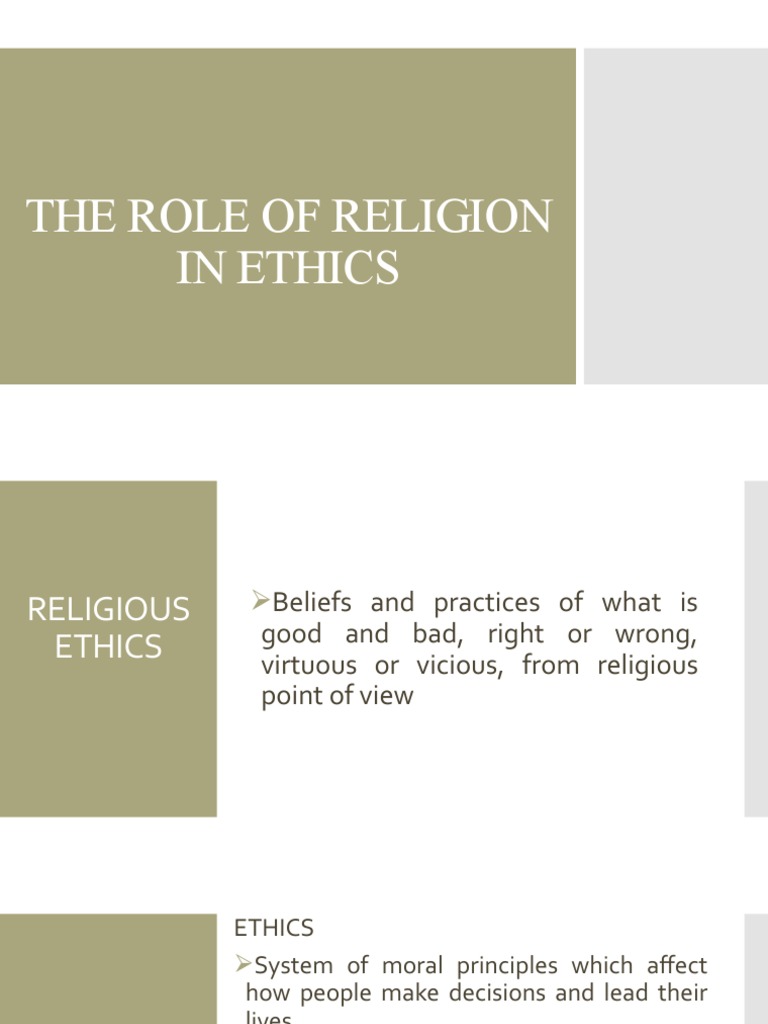In a world characterized by rapid transformations and unsettling complexities, the inquiry into the role of religion in establishing an ethical society becomes crucial. How does faith contribute to the fabric of morality, and can its teachings serve as a guiding compass for humanity? The Bahá’í teachings present a compelling framework that not only addresses these questions but also poses an intriguing challenge: can a harmonious society emerge when diverse religious principles converge? This article delineates the multifaceted role that religion, particularly through the lens of Bahá’í teachings, plays in nurturing an ethical society.
The Interrelation of Religion and Ethics
At the core of Bahá’í thought is the assertion that religion is fundamentally a unifying force, a catalyst for ethical development. The Bahá’í Faith posits that the divine is a source of moral guidance that transcends cultural and temporal boundaries. Religion, in this light, is not merely a set of dogmas or rituals; it is a living, dynamic entity that evolves, providing its followers with the moral tools necessary to confront contemporary challenges.
Ethics, as understood within the framework of Bahá’í teachings, is intrinsically linked to the principles of justice, service, and the fundamental oneness of humanity. By synthesizing spiritual and ethical tenets, Bahá’ís believe that each individual is called to embody moral virtues such as honesty, compassion, and humility. It is through these virtues that the moral landscape of society is sculpted, leading to improved interpersonal relationships and communal cooperation.
A Foundation for Social Cohesion
One of the principal roles of religion in an ethical society is to foster social cohesion. The Bahá’í teachings advocate for the recognition of the inherent worth of every individual, emphasizing the interconnectedness among all people. By cultivating an atmosphere of mutual respect and understanding, religion can pave the way for collaborative efforts to address societal issues such as poverty, discrimination, and injustice.
This collaborative ethic is exemplified in the Bahá’í principle of consultation, which encourages collective decision-making and respects diverse viewpoints. When members of a community engage in open dialogues rooted in ethical principles, they forge stronger bonds and create a sense of accountability towards one another. Such a framework is essential in resolving conflicts and building a society that values ethics as a cornerstone of its existence.
The Role of Education and Spiritual Development
The Bahá’í teachings place significant emphasis on the importance of education and spiritual development in cultivating an ethical society. Education, in this context, goes beyond mere academic knowledge; it encompasses moral training that equips individuals with the necessary tools to discern right from wrong. By instilling ethical values from a young age, religious teachings can profoundly influence the character development of future generations.
Furthermore, spiritual development, as portrayed in Bahá’í writings, involves the continuous quest for self-improvement and enlightenment. Adherents are encouraged to engage in prayer and reflection, both of which serve to deepen one’s understanding of ethical principles. By aligning personal conduct with spiritual ideals, individuals contribute to the overarching ethical fabric of society.
The Universal Language of Ethics
Curiously, while distinct religions may exhibit differing practices and beliefs, the fundamental ethical principles often converge, pointing to a universal morality that transcends cultural divides. Bahá’í teachings advocate for the synthesis of religious truths, recognizing that each faith possesses unique insights into the collective pursuit of justice and virtue. This synthesis effectively cultivates an environment where ethical discourse can flourish.
However, the challenge remains: how can societies reconcile the pluralism inherent in diverse religious teachings while fostering a common ethical framework? The Bahá’í Faith proposes that by understanding the spiritual foundations of various religions, individuals can work towards a common goal of ethical living, one that respects diversity yet seeks to unify.
The Emphasis on Service and Altruism
Another pillar of Bahá’í ethics is the inclination towards service to humanity. The teachings implore individuals to engage in altruistic endeavors, fostering a culture where selflessness becomes the norm. This principle is not only a moral imperative but also serves as a powerful mechanism for reinforcing social bonds. When individuals dedicate their efforts to the betterment of society, they manifest the ethical directives outlined in Bahá’í scripture while simultaneously fostering a sense of belonging and community.
As individuals pursue acts of service, the intrinsic link between religious conviction and moral action becomes evident. The Bahá’í ethos encourages followers to view service not as an obligation, but as a privilege—a tangible expression of their faith that revitalizes both personal and collective ethical frameworks.
The Future of Ethical Societies in a Bahá’í Context
Looking ahead, the role of religion in ethical societies, particularly through the prism of Bahá’í teachings, presents a transformative vision. It calls for a re-examination of how ethical behavior is cultivated, challenging the assumption that morality can flourish in isolation from spiritual influences. The continued integration of religious principles into the ethical discourse has the power to mitigate societal challenges and foster a more unified global community.
As we confront an era rife with uncertainty and ethical dilemmas, the Bahá’í perspective serves as a beacon, illuminating the path towards an ethical society. Yet, the question lingers: how can we collectively navigate the complex terrains of ethics shaped by diverse religious doctrines? Engaging in this dialogue may very well lead to innovative solutions that honor our shared humanity while celebrating our differences.
In conclusion, the teachings of the Bahá’í Faith elucidate the profound role of religion in shaping ethical societies, emphasizing the importance of unity, education, service, and the recognition of universal ethical principles. Through the concerted efforts of individuals and communities, a more harmonious world is achievable, reflecting the timeless legacy of sound ethical praxis.
